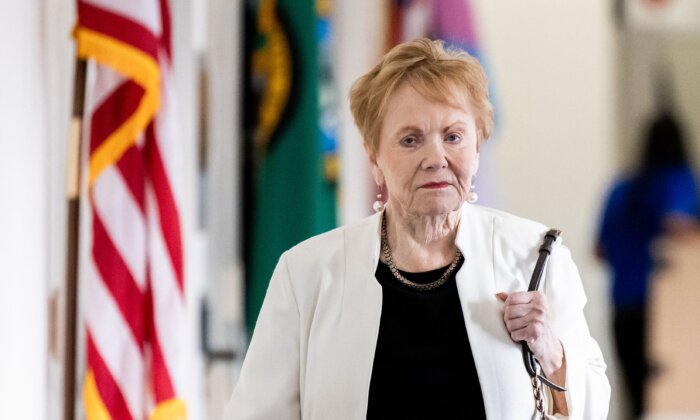How Denver nonprofits are trying to stem the migrant crisis by reducing poverty, creating stability in Guatemala
JOCOTENANGO, Guatemala — On a quiet cobblestone avenue in a city 90 minutes exterior of Guatemala Metropolis, class was in session for a whole bunch of younger Guatemalans on a Monday morning. Youngsters in kindergarten by way of ninth grade moved by way of the open-air courtyard of the free personal college for deprived college students, which is run by a worldwide nonprofit group based mostly in Denver.
Painted on the wall by its entrance had been the Spanish phrases, “La escuela, la esperanza” — or “The varsity, the hope.”
Greater than 1,900 miles north of the College of Hope, Denver metropolis officers and residents have grappled for greater than a yr with accommodating a surge of immigrants — largely from Venezuela — that has stretched metropolis sources. However going again six many years, Guatemala has served as a recurring supply of newcomers to the state, with 2022 census knowledge exhibiting Colorado was dwelling to about 7,900 individuals who had immigrated from the Central American nation.
Whereas the inflow from Venezuela has drawn the newest consideration, Guatemala has lengthy ranked among the many prime Latin American sources of migrants to the US; it solely fell behind Mexico and Venezuela throughout the newest federal fiscal yr. Between 2000 and 2021, the variety of foreign-born Guatemalans within the U.S. greater than tripled to about 1 million, in line with the Pew Analysis Middle.
To curb migration, two Denver-area nonprofits are taking a hands-on method in Guatemala. They’re engaged on the bottom to cut back poverty and deal with different situations which have spurred a lot of its residents to journey to the U.S.
Schooling for the Youngsters Basis offers at-risk college students with free schooling, meals and psychological well being providers in Jocotenango, aiming to set them up for future success in their very own nation. In the meantime, Lakewood-based Friendship Bridge makes enterprise loans to Indigenous ladies who’re entrepreneurs in rural areas, serving to them to construct lives for themselves and their households.
The migrant disaster “will not be a difficulty that may be dealt with by anybody nation, anybody state, anybody metropolis or anybody nonprofit,” stated Juan Carlos Franco Orellana, a normal case supervisor on the Denver nonprofit Servicios de La Raza. However, he added, “organizations like these which might be placing in that work to enhance situations in Guatemala — I’d say, they’re those actually making headway.”

Throughout a go to by a Denver Put up reporter to the College of Hope in late February, eighth grader Juan Carlos spoke about his hopes in a rustic the place a scholar’s future is broadly decided by schooling. His final identify was withheld, on the college’s request, for privateness.
He’s one in all seven siblings, and a brother has already traveled removed from dwelling to chase the American dream. However Juan Carlos, 14, goals to graduate and keep in Guatemala to help his household.
He first earned pocket change by sprucing sneakers on the road. Now, after college lets out for the day, he heads to the native market, the place his sister sells rooster. He hawks clothes, making a month-to-month common of 500 to 600 quetzales, the equal of $64 to $77.
However the budding entrepreneur has plans that transcend market stalls: to get his highschool diploma, then pursue a profession as both an agronomist or a chef.
“I hope that we now have a greater future right here in Guatemala,” Juan Carlos stated in Spanish by way of a translator, whereas sitting in a classroom.

William Gómez, 42, a profession counselor on the college, sees himself within the pupils he mentors. His childhood dream was to turn into a physician, he stated, however his household couldn’t afford that ambition. His father, a widower, labored for many years at a warehouse to help Gómez and three siblings as they grew up within the close by metropolis of Antigua. At age 10, Gómez helped craft ceramic collectible figurines to promote on the market.
All through his life, he’s thought-about migrating to the U.S. looking for job alternatives.
However at present, Gómez stays in his dwelling nation. He’s buoyed, he stated in Spanish, by the hope that his college students will “be that change that the nation and the world wants.”

Civil conflict, corruption and inequality
Current-day Guatemala was solid by a tumultuous historical past, together with many years of civil conflict and corrupt politics, together with excessive financial inequalities. Vital numbers of residents have left the nation to flee these conflicts and pressures — together with immigrants who established longstanding Guatemalan communities in Alamosa and Denver.
“It is a nation that was actually constructed on a base of inequality,” stated Regina Bateson, an assistant professor of political science on the College of Colorado Boulder. “The issue will not be a sheer lack of wealth. The issue is the distribution of that wealth.”
In a nation the place about half of the inhabitants identifies as Indigenous — the Maya are the most important Native group — these residents are overwhelmingly impacted by racial prejudice and poverty. The injustices date again centuries, with many Indigenous Guatemalans compelled into agricultural labor by way of debt servitude within the nineteenth century.
The mounting systemic issues exploded into the Guatemalan Civil Battle in 1960.
Because the federal army and leftist guerrillas fought for 36 years, greater than 200,000 Guatemalans died — most of them Indigenous. The violence drove survivors from their houses. Whereas the conflict resulted in 1996 with a peace accord, “plenty of the problems that precipitated the civil conflict remained unresolved,” Bateson stated.
In the present day, a whole bunch of Indigenous households from the municipality of Santa Eulalia in western Guatemala reside in Colorado’s San Luis Valley. Generations have referred to as it dwelling since migrants started resettling there within the Nineteen Eighties.

Father Carlos Alvarez of Alamosa’s Sacred Coronary heart Church stated the mountainous area reminded the newcomers of Guatemala, with the church and the mushroom farm — lengthy the immigrants’ largest native employer — serving as group focal factors.
Lots of the Guatemalans who first moved to the valley had been initially looking for asylum within the U.S. A bunch of church buildings established the San Luis Valley Immigrant Useful resource Middle to treatment the absence of immigration attorneys within the space, stated government director Flora Archuleta. Its workforce has since helped immigrants put together their work authorization paperwork and renew their inexperienced playing cards.
The mother and father of Marisol Cristobal-Lucas, 27, got here to Alamosa in one of many waves of migration. Throughout Guatemala’s civil conflict, her father, Lucas Francisco Lucas, was one of many younger Mayan males picked up at random by militants and educated for months in guerrilla warfare.
In 1986, he crossed the southwestern U.S. desert as an undocumented immigrant to work on the mushroom farm in Colorado together with his brother.
“It was alternative for them to make good cash,” Cristobal-Lucas stated.
Her mom, Eulalia Cristobal Sebastian, joined her father round 1993. Each had initially anticipated their keep within the U.S. to be non permanent as they saved cash. However Cristobal-Lucas stated her father ultimately grew to become a U.S. citizen by way of applications set in movement by a Reagan-era amnesty regulation, and her mom secured a inexperienced card.
Many years later, Servicios de La Raza’s Orellana stated, again in Guatemala, “economically, issues are nonetheless very laborious.” Even blue-collar industries, reminiscent of building, don’t provide the identical alternatives as within the U.S. as a result of Guatemala isn’t constructing infrastructure as rapidly, stated Orellana, who was born in Guatemala Metropolis.
Though the nation is dwelling to Central America’s largest financial system, with its gross home product valued at $95 billion in 2022, in line with the World Financial institution, over half of the inhabitants lives in poverty.
Guatemalans are pushing to cut back authorities corruption, however Bateson, the CU professor, referred to as home politics “fairly sophisticated,” with elected leaders liable to self-enrichment and involvement with organized crime.
“It’s some of the unstable get together techniques on the earth,” she stated.
Nonetheless, regardless of Guatemala’s challenges, Vivi Lemus is amongst immigrants right here who work to counter detrimental perceptions about their homeland. She is a co-owner of Convivio Café, a bilingual espresso store in northwest Denver, and has now lived in Colorado along with her husband for greater than 20 years.
“You hear corruption, you hear occupation and also you hear all of the strife,” stated Lemus, 48. “You seldom hear in regards to the hospitality, the kindness, the fantastic thing about folks, the flavors, the superb Mayan tradition that extends centuries — and the knowledge that’s my heritage.”

College’s aim is for college kids “to remain right here in Guatemala”
With its concentrate on bettering situations for Guatemalans, Denver-based Schooling for the Youngsters Basis started as a scholarship program 20 years in the past. In 2005, it expanded to open the College of Hope in Jocotenango, with 80 pupils at its begin.
The coed physique has since quintupled to 400, with a workers of about 60 staff. Yearly, the college accepts 40 or so new college students, normally of kindergarten age.
“We by no means promote, as a result of we now have an excessive amount of demand,” stated Sara Miller, the nonprofit’s U.S. government director. As an alternative, the pupils’ mother and father typically first be taught in regards to the college by way of phrase of mouth.

About 25% of these mother and father are illiterate, with the bulk having solely reached sixth grade of their schooling, Miller stated.
As a result of entry-level jobs typically require not less than a highschool schooling, unlearned Guatemalans are likely to earn a dwelling within the nation’s casual financial system. Nearly all of the nation’s working inhabitants — 68% of males and 76% of ladies — tried to earn money informally in 2021, says a report by the U.S. Company for Worldwide Growth.
Miller stated her college students’ fathers typically work as bus drivers and building employees, whereas their moms are paid to make tortillas, clear homes and iron garments. She estimates that the households earn the equal of $200 to $300 monthly.
In the present day, proof of Guatemala’s wealth inequalities is quickly obvious.

Whereas luxurious condo buildings tower over Guatemala Metropolis, to the west in Jocotenango, a shantytown of illegally constructed houses rises up the hillside of La Vista Hermosa — a makeshift group the place about 150 College of Hope households stay as squatters, Miller stated. The municipal land isn’t zoned for housing as a result of it’s liable to landslides, however residents settle for the chance to keep away from paying lease.
The cobblestone path winding by way of the neighborhood was traversed by relations choosing up their kids from the close by public college. Then, they hopped on bikes or into three-wheeled autos referred to as tuk-tuks — each low-cost modes of transportation in Guatemala. Throughout from a soccer area, a mural painted on a wall urged “la no violencia,” or nonviolence.

The general public schooling system is free, however is “actually underfunded,” Miller stated, with 60 college students crammed right into a classroom for simply three or 4 hours of instruction per day.
So, some mother and father decide to enroll their kids in personal college, although prices rapidly add up for varsity provides, uniforms and extra. The College of Hope helps ease these monetary burdens by providing high-quality schooling for gratis to its college students.
Aracely Chajón, director of the college’s social providers applications, stated the scholars’ households nonetheless cope with socioeconomic issues, generally leading to violence, alcoholism and absentee parenting in households. Chajón, 39, stated in Spanish that “a really lovely a part of the muse is to volunteer a spot the place (college students) really feel they’ve the arrogance” and the belief to specific themselves overtly in school. There, “somebody listens to them.”

In the course of the COVID-19 pandemic, Chajón and Miller watched as a number of of the college’s pupils left Guatemala, with 10 immigrating as unaccompanied minors to the U.S. to affix family. However different college students determined to stay within the nation as a result of they needed to graduate.
The bulk returned to high school when viral outbreaks eased, Miller stated.
“Our aim is for them to remain right here in Guatemala,” she stated.
She hopes to open each a preschool and a highschool. The muse plans to assemble one other constructing, which is able to price $1 million; it’s raised $500,000 for the mission up to now.
“By schooling and entry to alternatives, (college students) can discover a good job in Guatemala and have the ability to help themselves,” Miller stated. “Their kids will develop up in a really totally different surroundings.”

Entrepreneurship gives ladies new alternatives
Since Friendship Bridge launched its Guatemala operation in 1998, the Lakewood nonprofit has targeted on providing a lifeline by way of enterprise. It largely helps Indigenous ladies entrepreneurs by offering enterprise coaching, particular person loans, group lending and schooling on subjects, reminiscent of ladies’s rights.
Due to the dearth of medical care in rural Guatemala, the nonprofit additionally gives well being providers.
Greater than 20 years after its begin, Friendship Bridge now serves about 35,000 shoppers — ladies who sometimes come from impoverished communities and share the duty of caring for massive households, stated Indira Maldonado, the group’s communications and visible design coordinator. However they typically discover themselves caught in “a cycle of the poverty,” she added.
Maldonado, 25, locations a lot of the blame on her nation’s machismo-inflected tradition, which fosters violence, alcoholism and different issues.
“On this tradition of machismo, it’s actually laborious for ladies to have their very own voice,” she stated.
So, the nonprofit seeks to empower ladies as a result of, “whenever you give to ladies, they make investments all the pieces for his or her households,” Maldonado stated.

Lidia Par Puzul, 37, normally creates her items at dwelling, shaded underneath a roof of blue tarp and tin, within the small city of Cipresales within the nation’s western highlands. However throughout The Put up’s go to in late February, she demonstrated the artwork of beading at Friendship Bridge’s Guatemala headquarters in Panajachel.
Her wares — Christmas ornaments, chunky necklaces and animal collectible figurines of assorted colours and sizes — had been unfold out on the desk in entrance of her as she threaded minuscule beads onto a needle and pulled, working towards the ultimate product: a purple bracelet.
Like different Mayan ladies, she wore the standard outfit of a corte (skirt), huipil (shirt) and faja (belt). She stated she knew how one can embroider beads on shirts, too.
Par Puzul discovered how one can make handicrafts at 8 years previous — a ability taught by her father, who bought them across the nation. Saddled with the duty of serving to her household because the eldest daughter, she dropped out of faculty after ending fourth grade.
Her mom, additionally a craftswoman, secured her first mortgage of 500 quetzales, or about $64 in at present’s cash, by way of Friendship Bridge. Par Puzul joined as a younger grownup and has acquired a number of loans herself.
She used the cash to develop her handicraft store in Panajachel, which she ran along with her husband, José Ibate. She grew to become an artisan within the Handmade by Friendship Bridge program, with the nonprofit promoting her merchandise in its on-line retailer.
In 2017, thieves robbed the couple of supplies, merchandise and different gadgets price about 300,000 quetzales, or $38,414. José Ibate debated immigrating to the U.S. to earn cash for the household.
However due to Par Puzul’s work with Friendship Bridge, her partner stayed in Guatemala to rebuild their enterprise collectively.
A mom herself, Par Puzul stated in Spanish that, although college prices some huge cash, “what I would like is for my daughters to review, and that’s the most vital factor.”
Saida Perez, 51, can be a businesswoman from Guatemala. However “my story will not be very reflective to plenty of my conationals,” she stated. Rising up in Guatemala Metropolis, “I used to be a privileged child that was in a position to go to a personal college,” Perez added.
In 1989, she moved to the U.S. with the right paperwork and is now an American citizen.
Perez, who lives in Thornton, runs her personal insurance coverage company and caters to the native Latino group, particularly youth and girls. Because the founding father of Alianza Migrante Guatemalteca, or the Guatemalan Immigrant Alliance, she’s one of many advocates behind the institution of Denver’s Guatemalan consulate in 2004 and the 2013 passage by the state legislature of the Colorado Highway and Group Security Act. That regulation permits all qualifying Colorado residents — together with undocumented immigrants and refugees — to acquire commonplace driver’s licenses or ID playing cards.
“It’s a problem to stay exterior your nation, and to maintain traditions and to maintain the tradition and to be represented,” Perez stated. “I’m at all times going for extra — attempting for Guatemalans to have a voice.”
Almost 2,000 miles away, the native groups of Friendship Bridge and Schooling for the Youngsters Basis additionally attempt to hold attuned to the voices of Guatemalans as they work to enhance their lives, yr after yr.
To Maldonado, nonprofits like Friendship Bridge “help this imaginative and prescient for ladies to have higher futures, and the subsequent generations to have higher futures.” As a rustic, she stated, “we’re rising — perhaps with tiny steps, however we’re rising.”

















